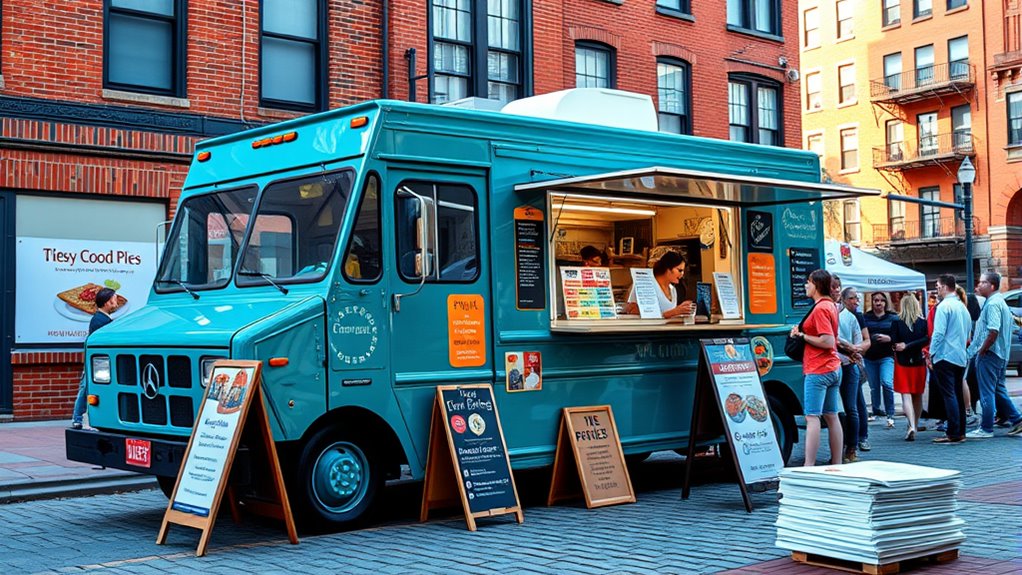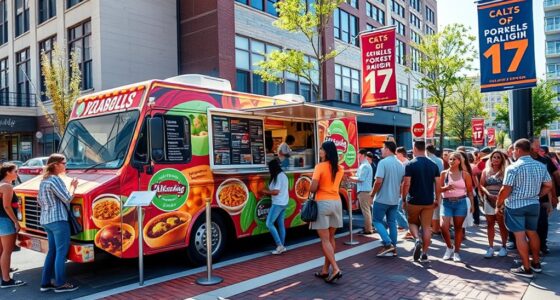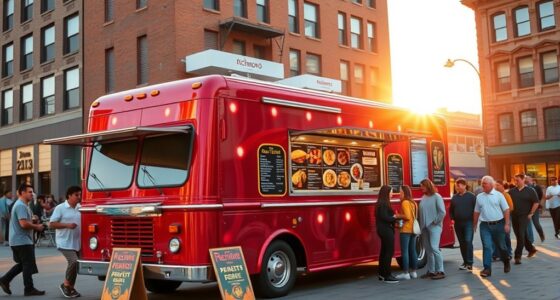To start a food truck in Albany, you need to secure permits like a Mobile Food Vendor License and health permits, which require passing inspections. Budget for vehicle costs, equipment, permits, and marketing, totaling several thousand dollars. Choose high-traffic locations but avoid residential zones and follow zoning rules. Develop a menu featuring regional ingredients and seasonal flavors. Use social media and local events for promotion. Keep compliance in mind—more details can guide your success as you get started.
Key Takeaways
- Obtain necessary permits including a Mobile Food Vendor License, health permits, and proof of insurance to ensure regulatory compliance in Albany.
- Budget for startup costs such as vehicle purchase, kitchen equipment, inventory, marketing, and ongoing expenses like fuel and wages.
- Operate in permitted zones like commercial and event areas, avoiding residential zones, and target high-traffic locations for maximum exposure.
- Develop a regional menu featuring local ingredients, seasonal flavors, and Albany favorites to appeal to community tastes.
- Use social media, participate in local events, and leverage data analytics to promote your food truck and attract loyal customers.
Navigating the Permitting Process in Albany
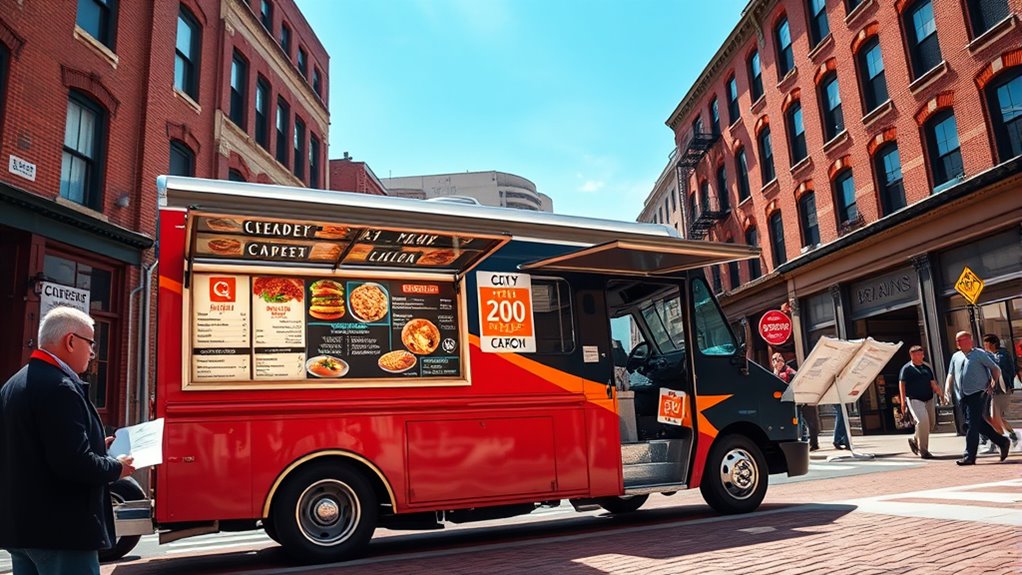
Guiding the permitting process in Albany requires understanding several key steps to ensure your food truck operates legally and smoothly. First, you need a Mobile Vendor License, obtainable through the City Clerk’s Office; check albanyny.gov for application details. Be prepared to submit location maps and vendor info, as local rules vary. Operating without this license can lead to fines or shutdowns, even if you meet health standards. Next, secure a health department permit certifying food safety compliance, along with food handler permits for staff. If you plan to sell at special venues, like Empire State Plaza, you’ll need temporary permits. Additionally, gather proof of insurance and fire safety certificates, and consider a commissary agreement for food prep and storage. Understanding these steps keeps you compliant and ready to serve. Familiarity with local regulations can help you navigate any unexpected requirements or restrictions.
Understanding Startup Expenses and Fees
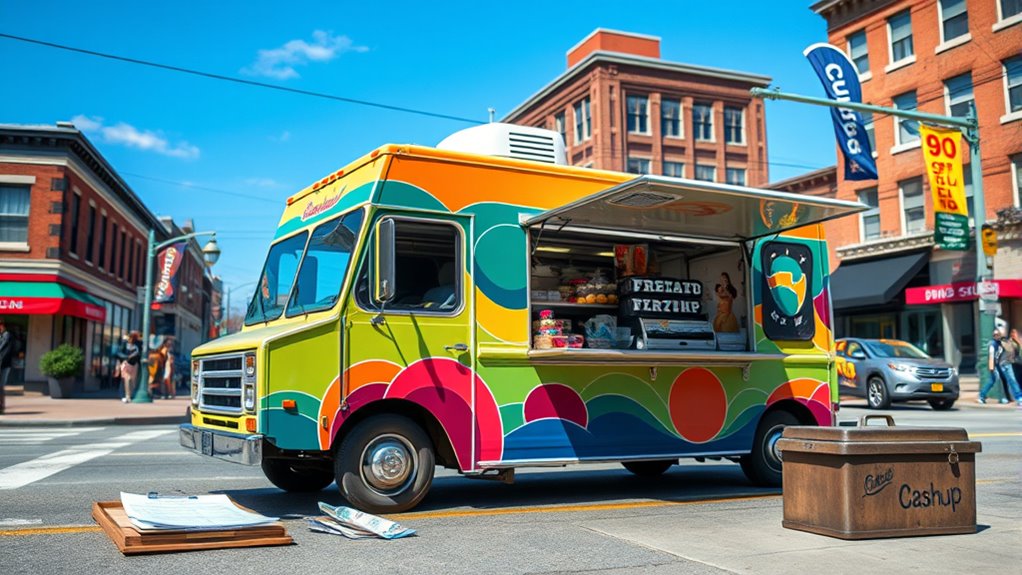
Starting your food truck business means understanding the costs involved, from permits and licensing fees to operational expenses. These upfront investments can vary widely depending on local regulations and your menu. Knowing what to budget for helps you plan effectively and avoid surprises down the line. Additionally, researching grocery store hours can assist in sourcing supplies efficiently and ensuring product availability during your operational hours.
Permits and Licensing Fees
Managing permits and licensing fees is a crucial step in launching your food truck in Albany, NY. You’ll need a Mobile Vendor License, which involves an application fee of $20, plus additional costs depending on your permit type. Peddler permits cost $20 plus $37.50 for six months or $75 annually, while Vendor permits are $20 plus $250 for six months or $500 for a year. Each application requires background checks and fingerprinting. You must also submit proof of insurance, including workers’ compensation or disability coverage, with specific forms. Additionally, health department permits are mandatory before operating, with fees like $30 for temporary food permits. These costs, along with insurance premiums, form a significant part of your startup expenses. Compliance requirements vary by location, so it’s essential to check with local authorities to ensure you meet all specific regulations.
Operational Expenses and Costs
Understanding your operational expenses and costs is essential to launching a successful food truck in Albany, NY. Your initial vehicle costs can range from $30,000 to $175,000, depending on whether you buy new or used. Kitchen equipment, including grills, fryers, ovens, and refrigeration, could add another $2,000 to over $10,000. You’ll also need safety gear like sinks and fire systems, costing around $2,000 to $5,000. Startup inventory might require $2,000 to $3,000, plus about $300 for serveware. Ongoing expenses include fuel, maintenance, wages, insurance, and parking fees, totaling roughly $1,000 a month. Marketing and branding costs can reach up to $5,000 initially, with recurring expenses for digital ads and event participation. Technology setup, like POS systems, may cost $500 to $2,000 upfront. Additionally, securing proper insurance coverage is critical, with costs varying based on coverage levels and provider choices which can significantly affect your overall expenses. Incorporating durable survival gear essentials into your planning can help mitigate unexpected disruptions and ensure readiness during unforeseen circumstances.
Ideal Locations and Zoning Regulations
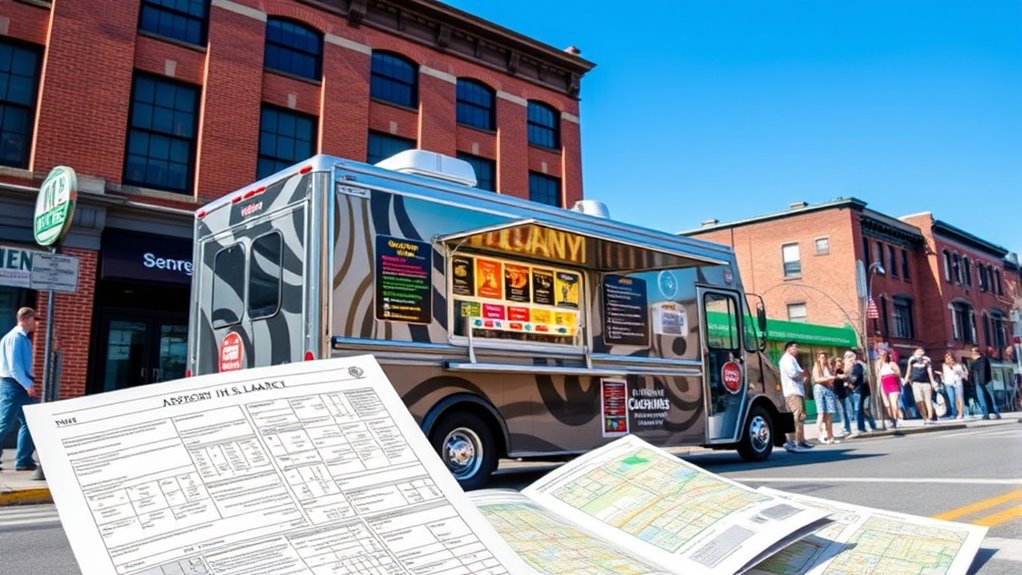
Finding the right location for your food truck in Albany depends heavily on adhering to zoning regulations that specify where vending is permitted. You need to operate only in zones where vending is allowed, such as commercial or mixed-use areas, and avoid strictly residential zones that restrict sales or large structures. Setback and distance requirements from residences help minimize disturbances, and noise or operation hours may be limited, especially near homes. You’ll also need to submit precise location plans and obtain approvals from the City Clerk or relevant departments, which may include inspections or public hearings. Understanding local zoning laws is essential to prevent violations and ensure a smooth operation for your food truck. Additionally, being aware of permitting procedures can streamline your approval process and help you avoid potential delays. Ideal spots include high foot traffic areas, parks, or event zones with proper permits, ensuring you’re compliant while maximizing visibility.
Crafting a Menu That Appeals to Local Tastes
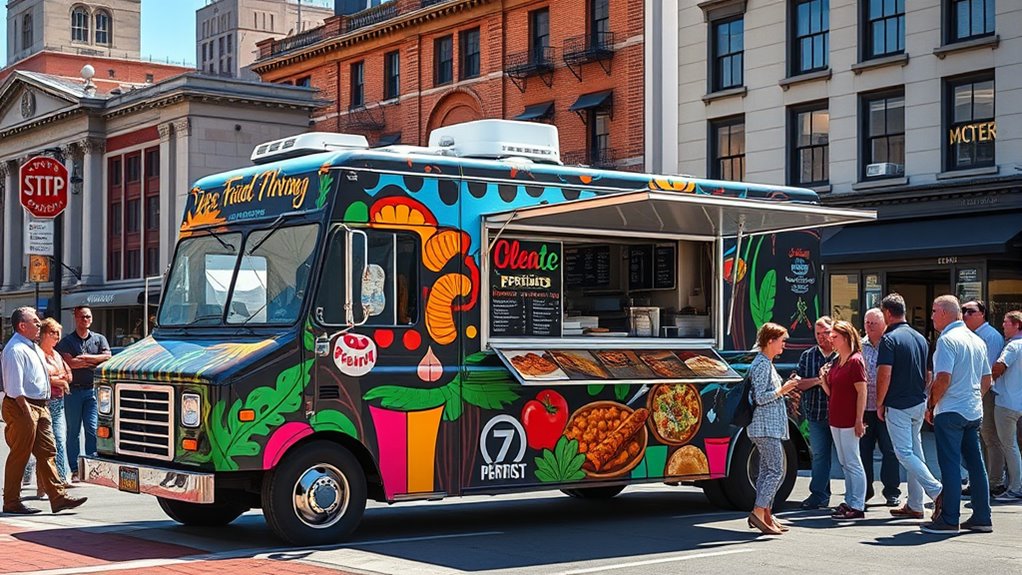
To appeal to local tastes, focus on highlighting fresh, regional ingredients in your menu. Embrace seasonal flavors to keep offerings exciting and relevant throughout the year. Incorporating regional favorites guarantees your food truck resonates with Albany’s community and its culinary traditions. For example, offering local burger varieties such as Impossible Burgers, mushroom, bison, and elk burgers from nearby caterers can help attract a loyal customer base. Additionally, understanding building codes and permits can ensure your menu and operations remain compliant with local regulations.
Highlight Local Ingredients
Incorporating local ingredients into your menu not only supports nearby farmers and producers but also resonates with Albany customers seeking fresh, familiar flavors. You can highlight regional vegetables like bell peppers, tomatoes, green beans, and peas to create vibrant, seasonally inspired dishes. Using locally sourced proteins such as chicken, beef, eggs, and canned beans adds authenticity and supports local agriculture. Incorporate dairy products like cheeses and milk from nearby producers to enhance flavor and showcase regional quality. Whole grain options like brown rice and whole wheat tortillas appeal to health-conscious patrons. Emphasizing these local ingredients demonstrates your commitment to fresh, sustainable sourcing and connects your menu to Albany’s community, making it more appealing and memorable to local customers. Additionally, understanding sound design techniques can help you create engaging marketing content, such as promotional videos or audio advertisements, to attract more customers to your food truck.
Embrace Seasonal Flavors
Embracing seasonal flavors means designing your menu around the freshest, highest-quality ingredients available throughout the year. Focus on a small selection of seasonal produce and proteins to highlight their natural flavors and keep dishes simple. Sourcing locally supports sustainability, reduces waste, and appeals to eco-conscious customers. Reinvent comfort foods with seasonal twists by incorporating fresh ingredients, creating familiar yet innovative offerings. Regularly updating your menu quarterly or monthly keeps things exciting and maintains high quality. Include healthful, seasonal ingredients like antioxidant-rich vegetables and gut-friendly grains to attract wellness-focused diners. Experiment with bold flavor pairings using local herbs and spices, and add seasonal condiments or sauces to elevate dishes. This approach strengthens your connection to Albany’s environment and resonates with customers seeking fresh, authentic experiences. Incorporating menu flexibility allows you to adapt quickly to ingredient availability and customer preferences, ensuring your offerings stay relevant and appealing throughout the seasons.
Incorporate Regional Favorites
Highlighting regional favorites can make your food truck stand out by resonating with local tastes and traditions. Albany’s signature dishes, like mozzarella sticks with raspberry sauce, showcase the inventive palate of the area. Mini hot dogs topped with meat sauce, mustard, and onions are a regional staple, as are local treats like Stewart’s Ice Cream, offering flavors that reflect Upstate NY’s seasonal bounty. Incorporate local ingredients such as Catskills trout or regional cheeses to connect with the community. Dishes inspired by neighboring areas, like Spiedies or Buffalo wings, also appeal to regional preferences. The region’s agricultural heritage includes famous products like grape pie and apple varieties, which can inspire unique menu items. By featuring these favorites, your menu not only celebrates Albany’s culinary identity but also attracts locals seeking familiar flavors, creating a strong regional connection. Embracing regional culinary traditions can help establish your food truck as an integral part of the local scene.
Effective Marketing Strategies for Food Trucks
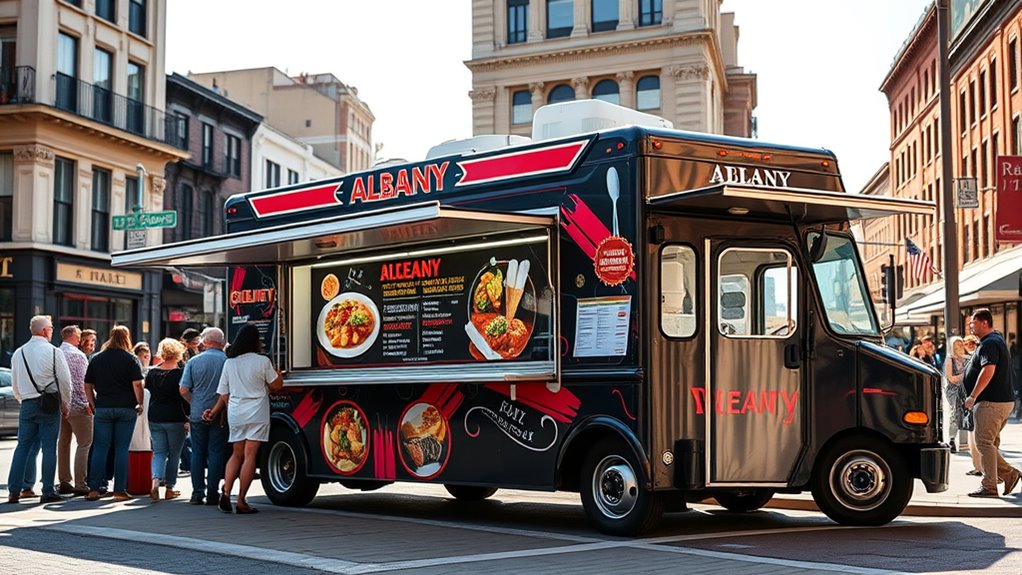
Effective marketing is essential for food trucks to stand out in a competitive landscape. Social media is a powerful tool—68% of food truck owners use platforms regularly, with Facebook leading at 75%. These campaigns can boost sales by 20% and encourage customers to spend 15% more. Participating in local events and festivals, which 80% of trucks do annually, increases exposure and builds loyalty through direct experience. Leveraging data analytics and GPS apps helps you identify ideal locations and target customers effectively, boosting marketing ROI by 25%. Loyalty programs and email marketing also drive repeat business, with over half of trucks reporting a 30% increase in visits. Additionally, understanding the effectiveness of eye patches can inform product placement or promotional strategies if health or beauty items are involved, as effectiveness of eye patches can vary based on individual skin types and conditions. Finally, tailoring your marketing to local demographics and emphasizing convenience and novelty attracts new customers and fosters brand loyalty.
Ensuring Compliance With Health and Safety Standards
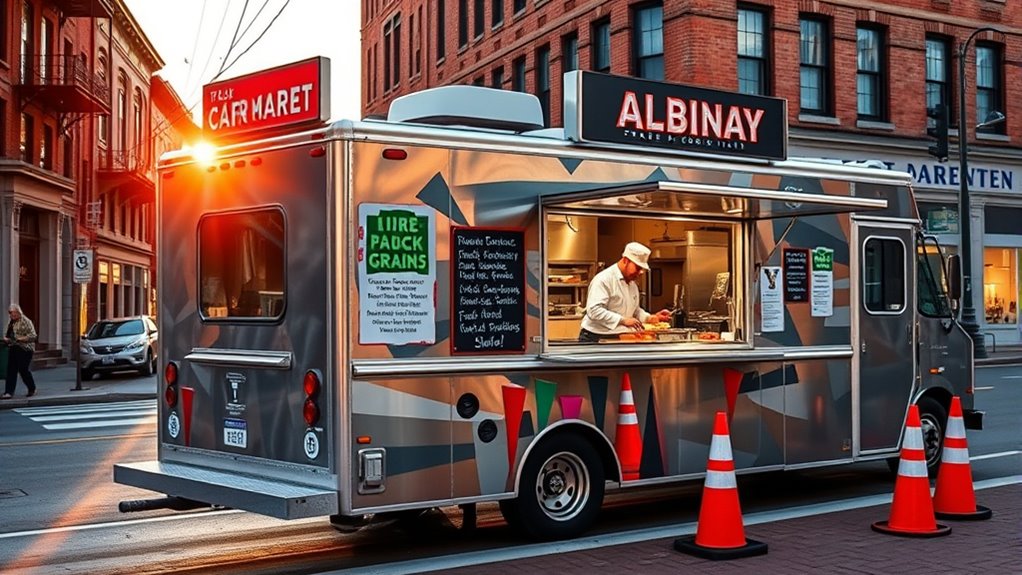
Ensuring compliance with health and safety standards is essential for operating a successful food truck in Albany, NY. First, you must obtain a Mobile Food Vendor License from the Albany City Clerk’s Office and pass health inspections by the Albany County Department of Health. You’ll need to follow New York State Environmental Health Regulations, including sanitation and food safety protocols. Proper food handling, such as temperature controls, hygiene practices, and equipment cleanliness, is critical. Manage wastewater and waste disposal carefully, using approved methods and maintaining onboard tanks to prevent spills. Use compliant equipment, install safety devices like carbon monoxide detectors, and submit design plans for approval before setup. Regular staff training and detailed record-keeping guarantee ongoing compliance and help avoid fines or shutdowns.
Frequently Asked Questions
How Long Does the Entire Permit Approval Process Typically Take in Albany?
The permit approval process in Albany usually takes about 2 to 4 weeks for vendor permits, but health inspections can extend it to 4 to 6 weeks. Temporary permits are faster, often within 1 to 2 weeks. The overall timeline depends on how complete your paperwork is, how quickly inspections are scheduled, and if any corrections are needed. Staying in touch with the authorities helps keep the process on track.
Are There Any Restrictions on Operating Hours for Food Trucks in Albany?
You need to be aware of Albany’s strict operating hour restrictions for food trucks. You’re only allowed to operate from 8:00 a.m. to 9:00 p.m. daily, and setup can start no earlier than 7:00 a.m. To stay compliant, verify your permits specify these hours, and always follow enforcement rules. Operating outside these times can lead to fines or permit revocation, so plan your schedule carefully.
Can I Operate My Food Truck Year-Round in Albany’S Climate?
Imagine your food truck as a ship steering Albany’s seasonal seas. Yes, you can operate year-round, but you’ll need to weather the winter storms with insulation, heaters, and weatherproofing. Prepare for icy roads, snow, and reduced foot traffic. Adapt your menu and marketing strategies, partner with indoor venues, and stay compliant with safety regulations. With the right preparations, you’ll keep your culinary voyage sailing through every season.
What Are the Specific Parking Restrictions for Food Trucks in Albany?
You need to follow Albany’s parking restrictions closely. You can’t park on public roadways without permits, and you must avoid fire hydrants, driveways, and grass areas. You need a Mobile Food Vendor License (MFVL) to sell on public property. Parking in designated zones like the Empire State Plaza on Wednesdays from May to October is allowed. Always display your permit, obey signage, and report any incidents immediately to avoid fines or towing.
Are There Any Costs for Renewing Permits Annually in Albany?
Renewing your permits in Albany involves some necessary investments, but these fees help guarantee your business stays compliant and thriving. You can expect annual renewal costs ranging from $200 to $1,000, with additional charges for health inspections and insurance. These expenses support smooth operations, keeping your food truck on the move. Budget accordingly, as timely renewals prevent extra fees and help maintain your vibrant presence in Albany’s bustling food scene.
Conclusion
Starting a food truck in Albany seems straightforward—until you realize permits, costs, and zoning are just the beginning. You’ll spend hours perfecting your menu, marketing, and safety standards, only to discover the real challenge is managing the endless regulations. Ironically, what’s supposed to be a quick, tasty venture becomes a daily puzzle. But stick with it—you’ll find that, in Albany, the journey is just as flavorful as the food you serve.
